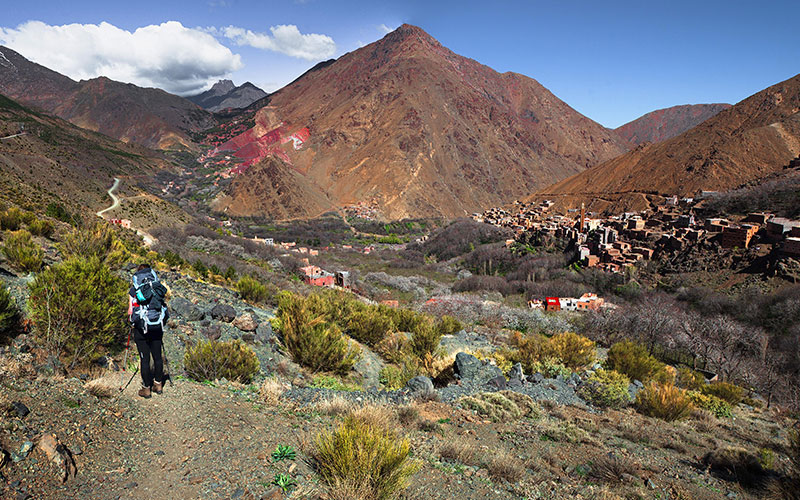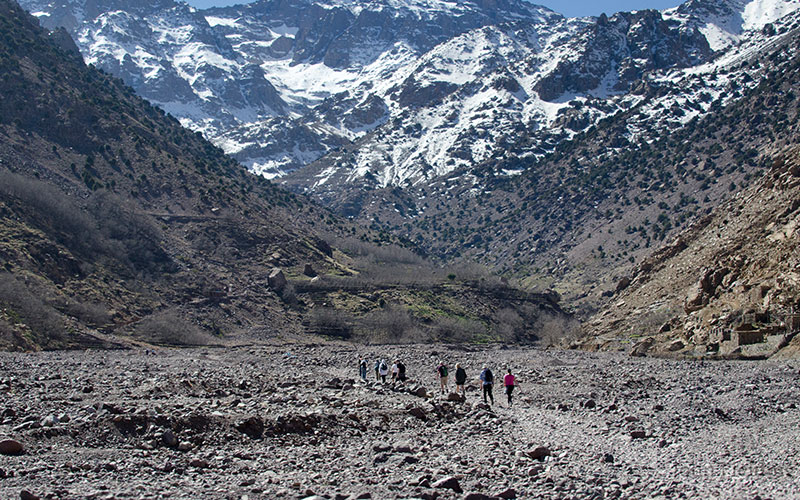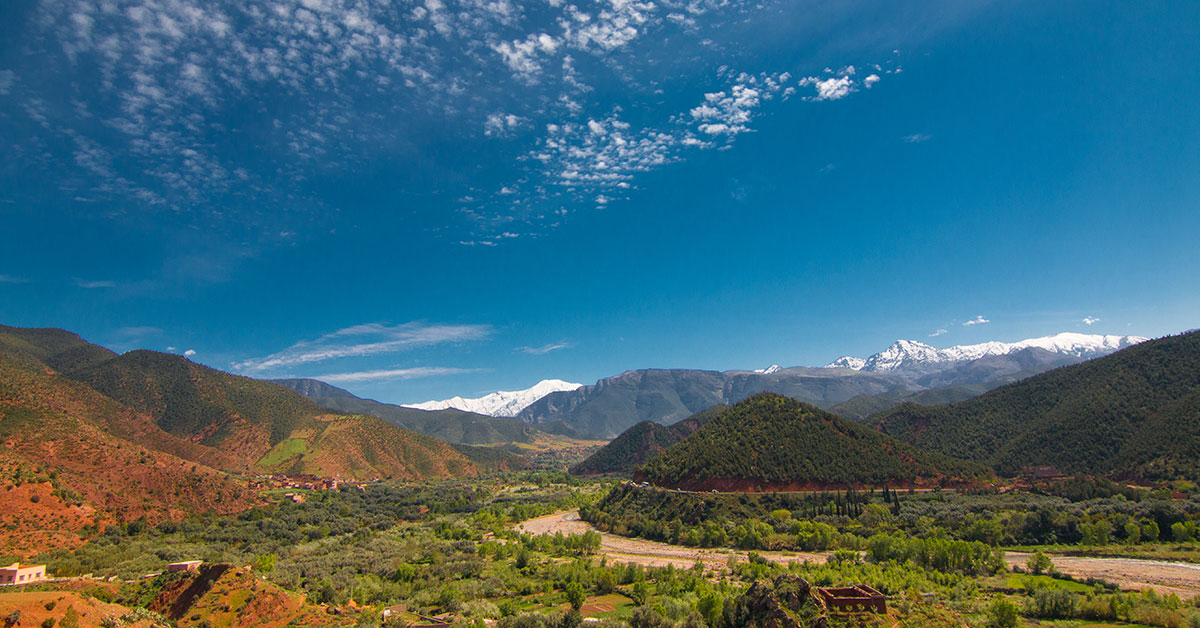Top Hiking Trails in Morocco’s Atlas Mountains

Morocco, a land of rugged beauty and diverse landscapes, unveils its hidden treasures in the Atlas Mountains. Stretching for over 1,200 miles across Morocco, Algeria, and Tunisia, the Atlas Mountains range is a testament to nature’s grandeur. In this breathtaking region, hiking enthusiasts discover an array of trails, none more captivating than those leading to the summit of Mount Toubkal, the highest peak in North Africa.
A list of Morocco’s Top 10 Atlas Mountain Trails
1. Toubkal National Park:
– Adventure Awaits: Scale North Africa’s zenith, Jebel Toubkal, amidst alpine wonders. The park boasts diverse flora and fauna, promising a trekker’s paradise.
– Trail Insights: Navigate challenging ascents rewarded with panoramic views, immersing yourself in the rugged beauty of the Atlas range.
2. Ait Bouguemez Valley:
– Valley of Wonders: Dubbed the “Happy Valley,” this region unveils a vibrant tapestry of green valleys, high plateaus, and the charm of traditional Berber villages.
– Trail Expedition: Encounter a mix of moderate and challenging trails, where each step introduces you to the warm hospitality of Berber communities.
3. Ourika Valley
– Day-trip Delight: A day hike from Marrakech, the valley beckons with cascading waterfalls, lush greenery, and an authentic immersion into Berber traditions.
– Trail Experience: Ideal for day-trippers, offering glimpses into local life against breathtaking landscapes.
4. Dades Gorge:
– Canyon Chronicles: Towering canyon walls and surreal rock formations define this gorge, boasting trails tailored for various skill levels.
– Trail Adventure: Explore the canyon’s depths, tracing well-marked paths amidst geological wonders.
5. Todra Gorge:
– Rock Climber’s Paradise: Famed for its awe-inspiring canyon walls, Todra Gorge invites rock climbers and leisurely walkers to savour its beauty.
– Trail Diversity: Challenge yourself with climbs or relish accessible paths, all while revelling in the gorge’s stunning scenery.
6. Imlil to Setti Fatma:
– Picturesque Passage: Connect Imlil to Setti Fatma along a scenic trail, weaving through remote Berber villages and treating hikers to panoramic mountain vistas.
– Trail Harmony: A moderate trek balancing cultural immersion with the allure of breathtaking landscapes.
7. Jebel Saghro:
– Undiscovered Realms: Venture into the lesser-trodden Jebel Saghro, where captivating landscapes, deep gorges, and distinctive rock formations await.
– Trail Solitude: Tailored for those seeking seclusion, offering a mix of challenging and moderate routes through unexplored terrains.
8. Sirwa Circuit:
– Nomadic Odyssey: Circle Mount Sirwa on an extended trek, revealing nomadic encounters, expansive plateaus, and diverse mountain vistas.
– Trail Expedition: A more extended commitment for those craving a profound exploration of the remote corners of the Atlas Mountains.
9. Jebel Mgoun:
– Roses and Peaks: Dive into the “Valley of Roses,” where high plateaus, deep canyons, and the challenge of summiting Morocco’s second-highest peak await.
– Trail Challenge: A demanding trek rewarding intrepid adventurers with spectacular landscapes and cultural interactions.
10. Ameln Valley to Tafraoute:
– Anti-Atlas Wonders: Traverse the Anti-Atlas region, encountering almond groves, traditional villages, and the captivating pink granite landscapes surrounding Tafraoute.
– Trail Diversity: Unravel this diverse trek’s unique blend of local culture, agriculture, and geological wonders.
Embark on this odyssey through Morocco’s Atlas Mountains, where each trail narrates a captivating story of nature’s grandeur, cultural richness, and the thrill of adventure.
Planning Your Atlas Mountains Hike: Tips and Considerations

Before embarking on a journey through the Atlas Mountains, planning thoughtfully is essential. Here are some key considerations:
1. Local Guides for an Authentic Experience:
When trekking in Morocco, opting for local guides enhances the authenticity of your Atlas Mountains tour. At Trekking in Morocco, a team of 15 guides, including city, mountain, and skiing guides, ensures an immersive experience. These guides, deeply rooted in the local culture, share insights into Moroccan traditions, providing a richer trekking experience.
2. Duration of the Mount Toubkal Climb:
The trek to Mount Toubkal caters to various difficulty levels, accommodating seasoned hikers and those seeking a more leisurely ascent. A full-day trip typically starts at 9 a.m. and concludes by 6 p.m., with the return to Marrakech. The trek duration can be customized based on preferences, with challenging hikes available for those seeking a more strenuous adventure.
3. Duration of Atlas Mountain Tours:
Atlas Mountain hiking tours vary from one to 16 days, offering flexibility for different schedules. Trekkers cover five to seven hours of walking daily, depending on fitness levels. Accommodations range from local guesthouses owned by Berber families to camping outdoors near villages during warmer months.
4. Day Trip Highlights:
For a one-day trek from Marrakech, the journey begins at 9 a.m. and includes visits to weekly markets, where traditional goods are bought and sold. The route passes through “Little Chamonix” in Imlil, offering glimpses into the local culture. Travellers enjoy Moroccan tea and snacks at a Berber family’s home, traverse waterfalls, revel in views of Mount Toubkal, and conclude the day with dinner in a local village before returning to Marrakech.
5. Extended Trips for a Deeper Exploration:
Extended Atlas Mountain trips, spanning two or three days, offer more immersive experiences. Travellers can choose between exploring multiple villages at a leisurely pace or embarking on a two-day ascent of Mount Toubkal, with the option to stay in a mountain hut or camp outdoors, depending on weather conditions.
6. Acclimatization for Altitude:
To address elevation challenges, consider spending a few days exploring villages at lower altitudes before ascending. This acclimatization method helps prevent altitude sickness and allows one to delve deeper into the local culture.
7. Packing Essentials:
For an Atlas Mountain hiking trip, pack essentials such as a sleeping bag, jacket, hiking boots, hats, warm clothes, and a first aid kit. Winter treks may require specialized equipment for snow and ice. While equipment shops in Imlil offer rentals, bringing personal gear is recommended.
8. Cultural Immersion:
Engaging with local communities along the trek adds a cultural layer to your journey. Participate in traditional Berber ceremonies, taste local cuisine, and learn about the unique customs that define the Atlas Mountains.
9. Flora and Fauna:
Explore the diverse flora and fauna of the Atlas Mountains. Each trek unveils a tapestry of biodiversity, from vibrant wildflowers in spring to the unique wildlife adapted to mountainous terrain.
10. Historical Insights:
Discover the historical significance of the Atlas Mountains. From ancient trade routes to Berber heritage, these trails carry stories that resonate through time.
Weather in the Atlas Mountains: A Year-Round Overview
Understanding the weather in the Atlas Mountains is crucial for planning a successful trek. The region experiences distinct seasons, each offering a unique hiking experience.
– Spring (March to May): Spring brings a burst of greenery, with blooming wildflowers carpeting the landscapes. Mild temperatures make it an ideal time for trekking.
– Summer (June to August): While summer brings warmer temperatures, it’s also the busiest season for tourism. Hikers can enjoy longer daylight hours, but crowded trails are familiar.
– Autumn (September to November): Autumn offers a gentle cool-down after summer. The landscapes transform with vibrant autumnal hues, providing a picturesque backdrop for treks.
– Winter (December to February): Winter in the Atlas Mountains brings a serene ambience, with snow-capped peaks creating a stunning contrast. Winter treks offer a quieter experience, but hikers should be prepared for colder conditions.
Other Trails to Hike in the Atlas Mountains of Morocco
While Mount Toubkal is a highlight, the Atlas Mountains boast numerous trails for hikers of all levels. Explore the following courses to expand your Atlas Mountain adventure:
1. M’goun Massif Circuit: This trek takes you around the M’goun Massif, the second-highest peak in the Atlas Mountains. The route offers stunning views, Berber villages, and a chance to immerse yourself in local culture.
2. Jebel Saghro Circuit: Venture into the Jebel Saghro region, known for its unique rock formations and lunar-like landscapes. This circuit provides a less-trodden path for those seeking solitude.
3. Tizi n’Test Pass: Ideal for a day trip, Tizi n’Test Pass offers breathtaking panoramic views. The trail takes you through terraced fields, walnut groves, and traditional villages.
4. Azzaden Valley Trek: This trek explores the beautiful Azzaden Valley, known for its terraced fields and traditional Berber villages. The trail offers a glimpse into the daily life of the local communities.
5. Ijoukak Valley Trek: Discover the remote Ijoukak Valley, surrounded by high peaks. This trek provides an off-the-beaten-path experience, allowing you to connect with nature.
Embarking on Atlas Mountain Treks: A Cultural Journey
Whether you opt for a day trip or an extended trek, the Atlas Mountains unveil a cultural journey intertwined with natural wonders. Each step immerses you in Morocco’s rich heritage, from the bustling markets to the welcoming Berber villages.
Conclusion: Atlas Mountains – A Tapestry of Adventure
In the heart of Morocco lies a tapestry of adventure woven by the trails of the Atlas Mountains. Whether you seek the summit of Mount Toubkal or the secluded paths of Jebel Saghro, each trek unfolds a story of cultural richness and natural beauty. Embrace the challenge, savour the moments, and let the Atlas Mountains etch their indelible mark on your journey. The call of the mountains beckons – answer it with every step you take in this mesmerizing realm of exploration and discovery.






